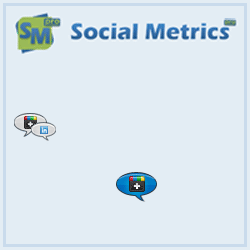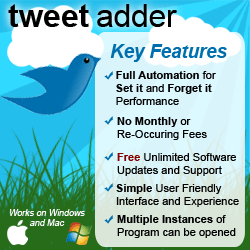Social Media Glossary M-P
 A to Z of Social Media Terms
A to Z of Social Media Terms
Are you confused with all of the buzz-words that surround Social Media and Social Networking? Don’t know your podcasting from your vodcasting?
Ever wondered the meaning of Search Engine Optimisation? And what exactly is a vlog? Or blogging? Or the blogosphere?
Fret no more! Here for the first time, in my wonderfully simplified Social Media Glossary are my definitions for all the latest social media buzzwords doing their rounds.
Did I miss something? CLICK HERE to tell me about the missing social media term and I’ll add it.
A-D| E-H | I-L | M-P | Q-T | U-Z
Mapping:
Mapping networks enables you see who are the main connecting people. To do that you may need to ask people who they communicate with most frequently. If you want to grow an online community or network from an existing “real world” network, it will be important that the key people in the network overlap with the champions for online networking.
Mashups
The smart mixes that techies do to combine several tools to create entirely new web services.
Meetings
Meetings are important in social networking in at least two ways. First, they accelerate the process of people getting to know each other. See Face-to-face. Second, the open and fluid style of social media is making those using it impatient with committee-style meetings and conferences dominated by platform speakers. With a little commitment it is possible to agree some meeting topics beforehand, circulate material, capture discussion at the time, carry on discussions afterwards … or maybe not have the meeting at all. Use Voice over IP, chat, instant messaging … or even a get-together in a virtual world.
Membership
Involves belonging to a group. Networking can offer some of the benefits of group membership, without the need for as much central co-ordination. A rise in networking may present challenges for organisations who depend on membership for funds or to demonstrate their credibility.
Meme
A unit of cultural information such as a popular tune, a catch-phrase, belief or fashion that can virally propagate from one mind to another. Online, it may be shared among bloggers or participants of social sites as a game, activity or quiz (e.g., name 50 favorite authors, the 100 worst songs, 10 favorite movies).
Micro-blogging
A form of blogging that allows users to write brief text updates (usually 140 characters) and publish them, either to be viewed by anyone or by a restricted group which can be chosen by the user, and then sent via text messaging, instant messaging, email, MP3 or web formats. Two common micro-blogging applications are Twitter and Digg.
Moblog
Abbreviated from “mobile blog”. This is a blog dedicated to the distribution, sharing and/or rating of digital/camera-phone images, audio-casts or videos.
MP3
An audio compression format that allows almost CD-quality fidelity with only 10% of the file size by discarding frequencies that cannot be heard by the human ear or that clash with similar frequencies. The name comes from MP(EG-1 layer) 3.
Narrowcasting
A term used in opposition to “broadcasting” to describe a podcast’s ability to reach a narrowly focused, highly interested audience.
Neophyte
Someone who is new to the Internet or new to computers in general, it refers to mature people who don’t want to be called a Newbie.
Netroot
A term coined to describe political activism organized through blogs and other online media including wikis, podcasts and various social networking sites.
Networks
Structures defined by nodes and the connections between them. In social networks the nodes are people, and the connections are the relationships that they have. Networking is the process by which you develop and strengthen those relationships.
Netizen
A citizen of the Internet, as in, one who spends a significant amount of time online or is an experienced user of the Net.
Newbie
Someone who is new to the Internet or new to computers in general. Mature people are normally called a Neophyte.
News Feed
A collection of headlines, news or story highlights, made available on the Internet in a standard format, often from a blog or news source made available in RSS format so that other sites and programs can check and download them automatically. News feeds can be used to publish information about podcasts. Podcast clients can subscribe to podcast news feeds, and use their information to find new shows to download.
Newsreader
A website or desktop tool that acts as an aggregator, gathering content from blogs and similar sites using RSS feeds, so you can read the content in one place, instead of having to visit different sites.
Online
Means being connected to the Internet, and also being there in the sense of reading or producing content.
Offline
Means not online, that is, not connected to the Internet. It may refer to an unconnected computer, or activities taking place without the benefit (or perhaps distraction) of a connection.
Online Communities
Groups of people communicating mainly through the Internet. They may simply have a shared interest to talk about … or more formally learn from each other and find solutions as a Community of Practice. Online communities may use email lists or forums, where content is centralised. Communities may also emerge from conversations around or between bloggers. List or forum-based communities can be difficult to join up with blog-based communities because of the different ways they operate technically. While communities do emerge organically, some community-building is necessary if there are specific goals to achieve.
Online Conference
Is what happens in a forum: it is the conversations of those involved, organised around topics, threads, and a theme or subject.
Openness
Is being prepared to share and collaborate – something aided by social media. Open source software – developed collaboratively with few constraints on its use – is a technical example. In order to be open online you may offer share-alike copyright licenses, and you may tag content and link generously to other people’s content. This demonstrates open source thinking.
Open-Source Software
Software often developed in a public, collaborative manner whose license permits users to study, change, improve and share the software, in a modified or unmodified form.
Outro
The ending sequence of a podcast; can include a music lead-out with an podcaster announcing credits, the episode and possibly the sponsor. The beginning of a podcast is commonly referred to as an “Intro”
Oyayubizoku
Young Japanese have become so adept at their phones — manipulating a set of cursor keys or a button-sized joystick by thumb — that some people refer to a new ‘thumb culture’. In Japan, they’re called oyayubizoku, which means “clan of the thumbs” or “thumb tribe.” See Thumbtribe.
Pain Points
Pain points used to be identified in order to solve a problem so that a business could take a specific action. Now they are what makes a business take action – faster and faster.
Participation – or participatory – culture
Used to describe a way of doing things in which people use social media to share and collaborate. Using social media certainly opens up more and more ways to do that. It may encourage openness and transparency. However, the tools do not on their own create a participatory culture, because people are unlikely to commit to using them unless they are that way inclined in the first place.
Pay-Per-Click (PPC)
Advertising model in which advertisers pay for click-throughs to their website. Ads are served based on keywords or themes.
Pay-Per-Download (PPD)
Similar to a pay-per-click ad campaign on a search engine, some companies offer auction models where advertisers upload commercials, content preferences and a bid for placement. As spots become available the auction house coordinates placing the commercials into the podcast. Advertisers pay only if a podcast is downloaded. The advertiser’s ability to define placement in a particular podcast depends on the auction house’s stable of podcasts and its willingness and abilities to target individual productions. See also Download Fraud.
Pay-To-Play
Different than pay-per-download in that viewers foot the bill. Consumers pay to download a video or audio file. Pay-to-play podcasts can be training, seminars, movies, concerts, sports programs or even TV shows.
Peer-to-peer: refers to direct interaction between two people in a network. In that network, each peer will be connected to other peers, opening the opportunity for further sharing and learning.
Permalink
is the address (URL) of an item of content, for example a blog post, rather than the address of a web page with lots of different items. You will often find it at the end of a blog post.
Photosharing
is uploading your images to a website like Flickr. You can add tags and offer people the opportunity to comment or even re-use your photos if you add an appropriate copyright license.
Ping
An acronym standing for “packet Internet grouper” or “packed Internet gopher”. This is an automatic notification sent when a blog has been updated. It also describes the automatic communication between networked computers/servers.
Platform
The framework or system within which tools work. That platform may be as broad as mobile telephony, or as narrow as a piece of software that has different modules like blogs, forums, and wikis in a suite of tools. As more and more tools operate “out there” on the web, rather than on your desktop, people refer to “the Internet as the platform”. That has advantages, but presents challenges in learning lots of different tools, and getting them to join up.
Plugin
Also called plugin, addin, add-in, addon, add-on, snap-in or snapin, consists of a computer program that interacts with a host application (a web browser, email client, or blog for example) to provide a certain, usually very specific, function “on demand”.
Pod Commercial
Similar to traditional radio commercial or ad; as short as 10-second long identification or ID ads or spots. Can be as long as a 10-minute or more interview, although at that length they are more commonly referred to as sponsorship pieces or podvertorials (an advertorial on a podcast).
Pod Sponsorship
Companies or organizations can purchase sponsorship rights to a podcast; packages vary widely in scope, price and editorial control. Sponsorship packages can include any of the following: “Brought to you by XYZ-Org” announcements; logos on promotional materials; corporate subject matter experts as guests; ads within the show; content control; links to the sponsoring site; etc.
Podcasts
A series of audio or video digital media files that can be downloaded via the Internet to portable media players, such as the Apple iPod, and personal computers.
Podcatcher
A term for programs used to automatically subscribe to and download podcasts; also called an aggregator. Podcatchers typically seek out new podcast episodes or items as soon as the program is opened.
Podvertorial
A podcast where the content is provided by a sponsor; similar to an “advertorial” in print publications which is a derivative of editorial and advertisement.
Post
To publish an item or comment on a blog or forum.
Predictive Analytics
The practice of extracting information from existing data sets in order to determine patterns and predict future outcomes and trends. Predictive models and analysis are typically used to forecast future probabilities with an acceptable level of reliability. Applied to business, predictive models are used to analyze current data and historical facts in order to better understand customers, products and partners and to identify potential risks and opportunities for a company.
Presence
Online has (at least) two aspects. One is whether you show up when someone does a search on your name. If not, no good pretending to be an online guru. The second is whether you use tools that show you are available for contact by instant messaging, voice over IP, or other synchronous methods of communication.
Profiles
The information that you provide about yourself when signing up for a social networking site. As well as a picture and basic information, this may include your personal and business interests, a “blurb” about yourself, and tags to help people search for like-minded people.
Proprietary software
Unlike Open-source software, proprietary software is owned by someone – whether Microsoft or a an individual developer. Some proprietary software may be free, and some open-source software may be sold. The issue is the terms under which the underlying code is available.
A-D | E-H | I-L | M-P | Q-T | U-Z
Social Media Glossary Appendix:
Sources:
- www.en.wikipedia.org
- www.netlingo.com
- www.google-kai.com/social-networking-glossary.html
- www.socialmedia.wikispaces.com/A-Z+of+social+media
- www.duranos.com/resources/web-glossary/
- www.fullcirc.com/weblog/2006/08/updating-my-online-interaction.htm
- www.problogger.net/archives/2006/06/27/a-z-of-professional-blogging/
- www.slideshare.net/travelinlibrarian/tech-terms
- www.digitaldialogues.org.uk/interimreport/glossary






